
YOUR SEARCH UNCOVERED 2352 RESULTS
-
23 June – A doctor and mathematician

-
22 June – The Execution of Bishop Fisher

-
20 June – Murder or Suicide?
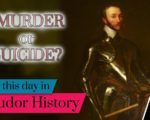
On this day in Tudor history, the night of 20th/21st June 1585, in the reign of Queen Elizabeth I, Henry Percy, 8th Earl of Northumberland, died at the Tower of London.
Was his death murder or suicide? And if it was murder, why?
Find out more…
[Read More...] -
Teasel’s Tudor Trivia – Books on the Tudor Kings and Queens

In this latest edition of Teasel’s Tudor Trivia, Tudor experts, historian Claire Ridgway and her researcher, Teasel the rescue dog, introduce their top picks for non-fiction books on the Tudor kings and queens.
The books featured are all excellent reads and are well-referenced – perfect for those just wanting to know more about the monarch or those who are using them for research.
Please do share in the comments if you have a favourite book on the Tudor monarchs.
[Read More...] -
19 June – Mary, Queen of Scots gives birth to a son called Charles
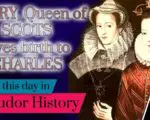
On this day in Tudor history, on 19th June 1566, in Scotland, Mary, Queen of Scots gave birth to a baby boy who would grow up to be King James VI of Scotland and King James I of England. He was baptised Charles James though.
Find out more…
[Read More...] -
14 June – Friar Peto

-
13 June – George Neville, a man with a very mixed court career
-
12 June – Richard Rich, lawyer and torturer
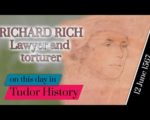
-
11 June – Sir Anthony Cooke
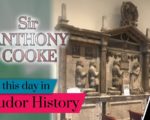
11th June 1576 was the death date of Sir Anthony Cooke, a well-known Tudor humanist and educator with famous daughters.
Find out more about this Tudor man in today’s edition of #TudorHistoryShorts…
[Read More...] -
10 June – Execution by starvation
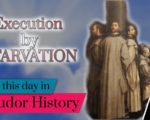
-
9 June – From traitor to sword bearer

-
Artists in the Spotlight – Kristina

-
8 June – Mary is very wrong
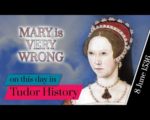
-
7 June – The execution of Elizabeth I’s physician
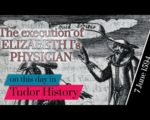
-
6 June – William Hunnis, a man lucky to die a natural death
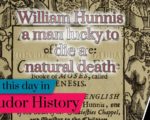
-
3 June – A bishop who helped his poorly queen
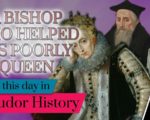
On this day in Tudor history, 3rd June 1594, John Aylmer, Bishop of London, died.
Hear a story about how he suffered pain to help a poorly Queen Elizabeth I in this edition of #TudorHistoryShorts:
[Read More...] -
31 May – Lady Margaret Beaufort
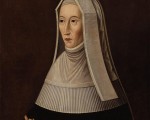
On this day in Tudor history, 31st May 1443, Lady Margaret Beaufort, the woman known as the matriarch of the Tudor dynasty, was born.
Find out a few facts about her in this #TudorHistoryShorts video…
[Read More...] -
30 May – Christopher Marlowe is stabbed!
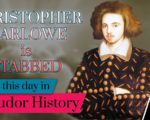
On this day in Tudor history, 30th May 1593, Christopher Marlowe, the famous Elizabethan playwright, was stabbed to death.
Find out what happened in this #TudorHistoryshorts video…
[Read More...] -
One Book Unites Two Rival Queens by Kate McCaffrey

Thank you so much to Kate McCaffrey for sharing this guest article with us today. Kate has been in the news recently because of her discovery of previously hidden inscriptions in one of Anne Boleyn’s Books of Hours at Hever Castle – a wonderful discovery.
Do follow the link at the end of this post to read Kate’s guest article on the Anne Boleyn Files too.
Over to Kate…
Catherine of Aragon and Anne Boleyn. Two queens, two wives, two rivals. They are both highly recognisable leading women from sixteenth-century England, but are also famed rivals in love and power. At best, we consider them to have had a fraught, divisive relationship. In today’s society, as is so often the case, we frequently see them as two women pitted against each other: one ‘good’, one ‘bad’, one Catholic, one Reformist, one wife, one mistress. Certainly, they were rivals and had many differing opinions and standpoints, but they also had key qualities in common. They were both highly educated, pious women who were at the whims of their changeable husband and who, in their own ways, were victims of patriarchal circumstance.
[Read More...] -
Artists in the Spotlight – Maggie

-
June 2021 – Tudor Life – Wrath
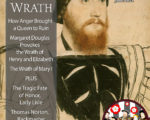
Bringing our “sins” series to a close, we have a packed magazine focusing on wrath. As you can imagine, this is a powerful magazine as the Tudor monarchs were well known for vengeance, fury and hate at times. 72 pages of Tudor articles.
[Read More...] -
26 May – A wife and mother of poets
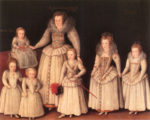
On this day in history, 26th May 1621, Barbara Sidney (née Gamage), Countess of Leicester, was buried at Penshurst.
Find out about this Tudor lady, whose marriage was the concern of several prominent Tudor men and who ended up marrying an Elizabethan poet.
[Read More...] -
21 May – Philip of Spain
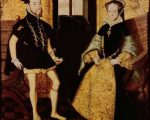
Today is the birthday of Philip II of Spain, king consort of Queen Mary I.
I commemorate his birthday by sharing a few facts about him…
[Read More...] -
17 May – Around the throne the thunder rolls

On 17th May 1536, poet, courtier and diplomat Sir Thomas Wyatt the Elder, who was imprisoned in the Tower of London, witnessed the executions of his fellow courtiers, George Boleyn, Henry Norris, Sir Francis Weston, William Brereton and Mark Smeaton.
Hear some of what he wrote about that awful day.
[Read More...] -
14 May – The Creeping Parliament
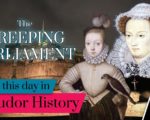
On this day in Tudor history, 14th May 1571, the “Creeping Parliament” was held in Edinburgh, Scotland.
Why was it called the “Creeping Parliament” and why were there actually two Parliaments meeting?
What was going on and what happened next?
Find out more…
[Read More...] -
13 May – Queen Anne Boleyn is on her way out
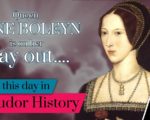
On 13th May 1536, eleven days after her arrest, the royal household of Queen Anne Boleyn was broken up and her household discharged.
The queen hadn’t even been tried yet, never mind found guilty!
Find out more about this day and what happened to members of her household in this #TudorHistoryShorts video…
[Read More...] -
Artists in the Spotlight – Sharon
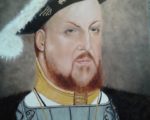
-
9 May – A proxy wedding for Marie de Guise and James V
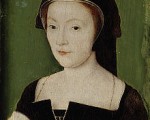
On this day in Tudor history, 9th May 1538, Marie de Guise, or Mary of Guise, got married to King James V of Scotland. However, the groom was not present.
Find out more in this #TudorHistoryShorts video…
[Read More...] -
6 May – The end of the Beaufort male line #shorts
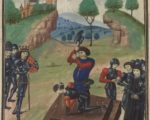
On this day in Tudor history, 6th May 1471, Edmund Beaufort was executed at Tewkesbury following the Lancastrian defeat at the Battle of Tewkesbury during the Wars of the Roses.
How did he come to be executed when he was in sanctuary, and why was this the end of the Beaufort line?
What did this mean for the Lancastrians?
[Read More...] -
Artists in the Spotlight – Sheena

